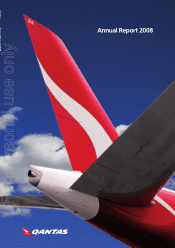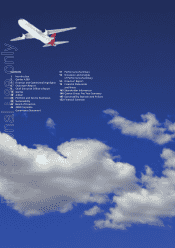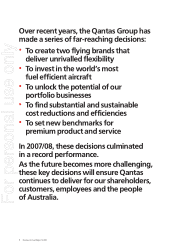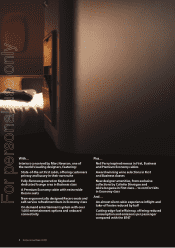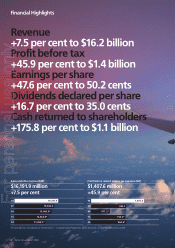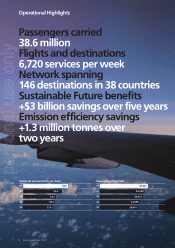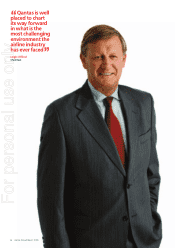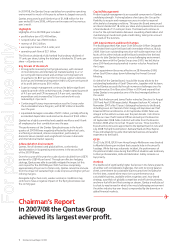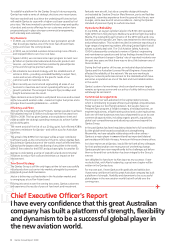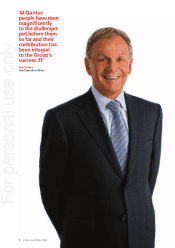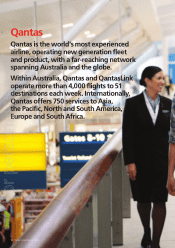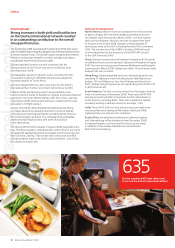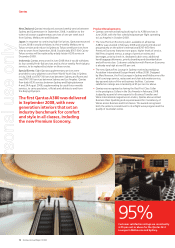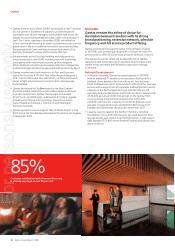Qantas 2008 Annual Report Download - page 9
Download and view the complete annual report
Please find page 9 of the 2008 Qantas annual report below. You can navigate through the pages in the report by either clicking on the pages listed below, or by using the keyword search tool below to find specific information within the annual report.
Chairman’s Report
In 2007/08 the Qantas Group
achieved its largest ever profit.
In 2007/08, the Qantas Group capitalised on a positive operating
environment for much of the year to achieve its largest ever profit.
Qantas announced a profit before tax of $1,408 million for the
year ended 30 June 2008, a 46 per cent increase on the previous
year’s result.
Highlights
Highlights of the 2007/08 year included:
• profit before tax of $1,408 million;
• net profit after tax of $970 million;
• revenue of $16.2 billion;
• earnings per share of 50.2 cents; and
• operating cash flow of $2.1 billion.
The Directors declared a fully franked final ordinary dividend of
17 cents per share, taking the total year’s dividend to 35 cents per
share – a Qantas record.
Key Drivers of the Result
• Strong performances by the flying businesses, with demand
in most domestic and international markets leading to a 1.2
per cent yield improvement and a 0.8 per cent improvement
in seat factor to 80.7 per cent for the Group. Jetstar’s domestic
build-up and international expansion led to a 42 per cent growth
of its profit before tax to $116 million.
• Superior margin management continued to deliver significant
capacity growth while containing costs. Despite capacity growth
of 4.0 per cent and CPI increases of 3.4 per cent, operating
expenditure only increased by 5.6 per cent and unit costs
reduced by 2.3 per cent.
• Continuing efficiency improvements across the Group under
the Sustainable Future Program, with $747 million in benefits
over the year.
• Liquidated damages receivable of $291 million, partially offset by
accelerated depreciation and asset write-downs of $165 million.
Qantas has a highly committed and capable workforce and I thank
all employees for their contribution over the year.
The performance of the Qantas flying businesses in the fourth
quarter of 2007/08 was negatively affected by higher fuel costs,
a softening in demand, intense competition, particularly in
domestic leisure markets and a significant increase in domestic
and international market capacity.
A New Aviation Environment
Qantas, like all domestic and global airlines, confronted a
transformation in its operating environment in the second half
of the 2007/08 year.
Over the course of the year the crude oil price doubled from US$70
per barrel to US$140 per barrel. Through an effective hedging
strategy, Qantas was able to partially mitigate the impact of this
cost impost for the 2007/08 year. With fuel now comprising
approximately 35 per cent of total costs, Qantas cannot be immune
from the impact of sustained high crude oil prices and higher jet fuel
refining margins.
Alongside higher fuel costs, weaker economic conditions may
continue to have a negative impact on the flying businesses over
the coming year.
Capital Management
Prudent capital management is an essential component of Qantas’
underlying strength. A strong balance sheet gives the Group the
flexibility to acquire and manage resources in order to respond
effectively to changing conditions. This year the Board announced
an interim dividend of 18 cents per share and is pleased to announce
a final dividend of 17 cents per share. The Board will continue to
strive for the optimal balance between rewarding shareholders and
maintaining an investment grade credit rating, taking into account
the needs of the business.
CEO Appointment and Board Changes
The Board appointed Alan Joyce Chief Executive Officer Designate
and invited him to join the Board with immediate effect on 28 July
2008. Alan is an outstanding executive with wide experience in all
facets of the airline industry and the Board considers him the best
person to take Qantas forward in a very challenging environment.
Alan has been with the Qantas Group since 2000, has led Jetstar
since 2004 and previously worked in senior roles for Ansett and
Aer Lingus.
Alan’s appointment becomes effective on 28 November 2008,
when Geoff Dixon steps down following the Annual General
Meeting.
On behalf of the Qantas Board, I would like to pay tribute to the
outstanding leadership of Geoff Dixon who, together with his team,
has led Qantas successfully through numerous challenges since his
appointment as Chief Executive Officer in 2000 and ensured that
today Qantas is recognised as one of the best managed airlines in
the world.
Both Paul Anderson and James Packer retired as Directors (in August
2007 and April 2008 respectively). Margaret Jackson AC retired in
November 2007 after 15 years’ distinguished service to the Board,
including seven as Chairman. Peter Gregg will step down as Chief
Financial Officer and Director on 30 September 2008. Peter was
integral to this airline’s success over the past decade. Colin Storrie
will be our new Chief Financial Officer and will join the Board on
30 September 2008. Mike Codd AC will retire from the Board in
October 2008, after more than 16 years’ service. Three new Non-
Executive Directors were appointed to the Qantas Board in June and
July 2008: Richard Goodmanson, Barbara Ward and Paul Rayner.
These individuals bring wide international business and aviation
experience to the Board.
QF30
On 25 July 2008, QF30 from Hong Kong to Melbourne was diverted
to Manila following an incident that caused a hole in the aircraft’s
fuselage. While this was a dramatic incident, the performance of
the pilots and cabin crew during that difficult situation was testimony
to their professionalism, skills and dedication. Safety remains our
top priority.
Outlook
The likelihood of significantly higher fuel prices in the future presents
all airlines with considerable challenges. But with its strong balance
sheet, commitment to sustainable business practices (including for
the first time, a stand-alone report on our performance as a
sustainable business, available online at qantas.com), two-brand
strategy, a portfolio of globally competitive and efficient businesses,
and more fuel efficient fleet coming on stream, Qantas is well placed
to chart its way forward in what is the most challenging environment
the airline industry has ever faced, compounded by the downturn in
global financial markets.
.
7Qantas Annual Report 2008
For personal use only

